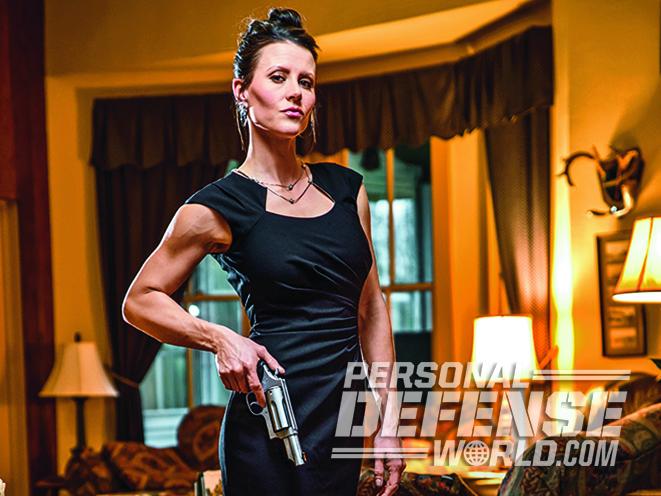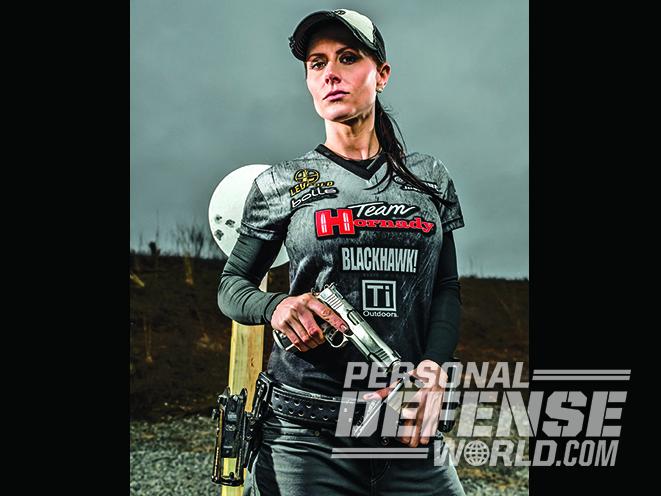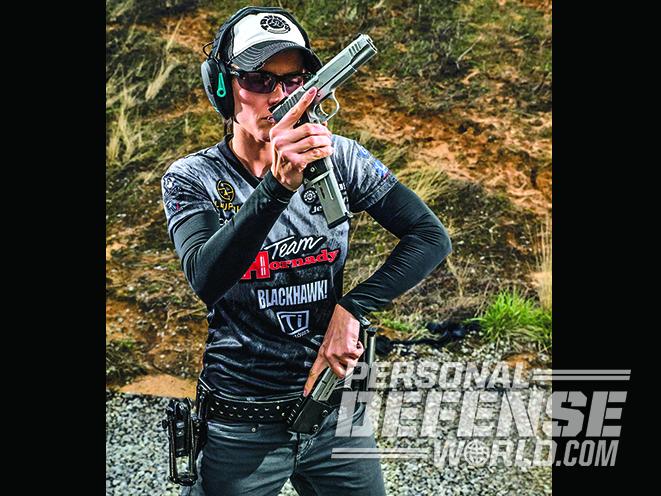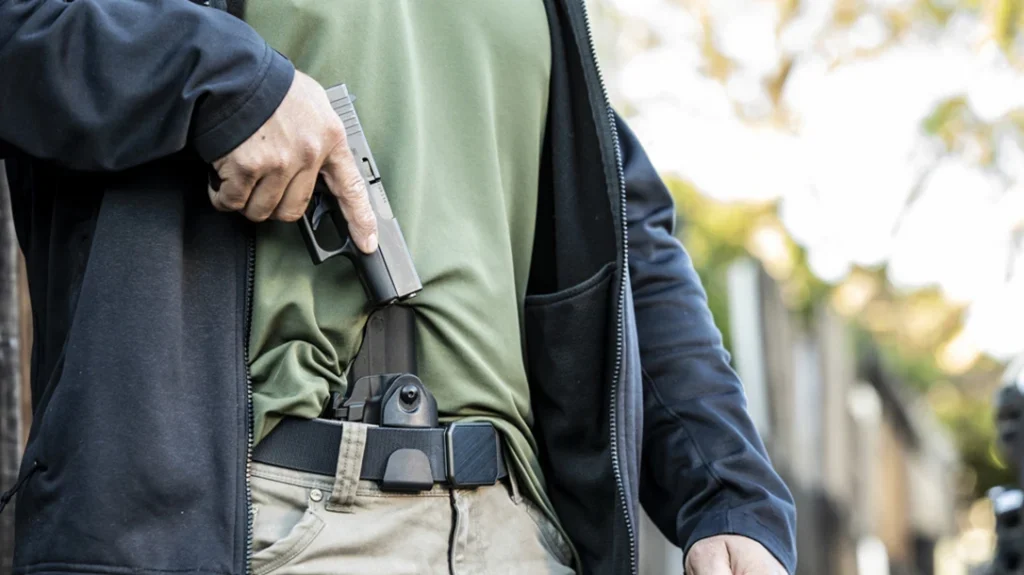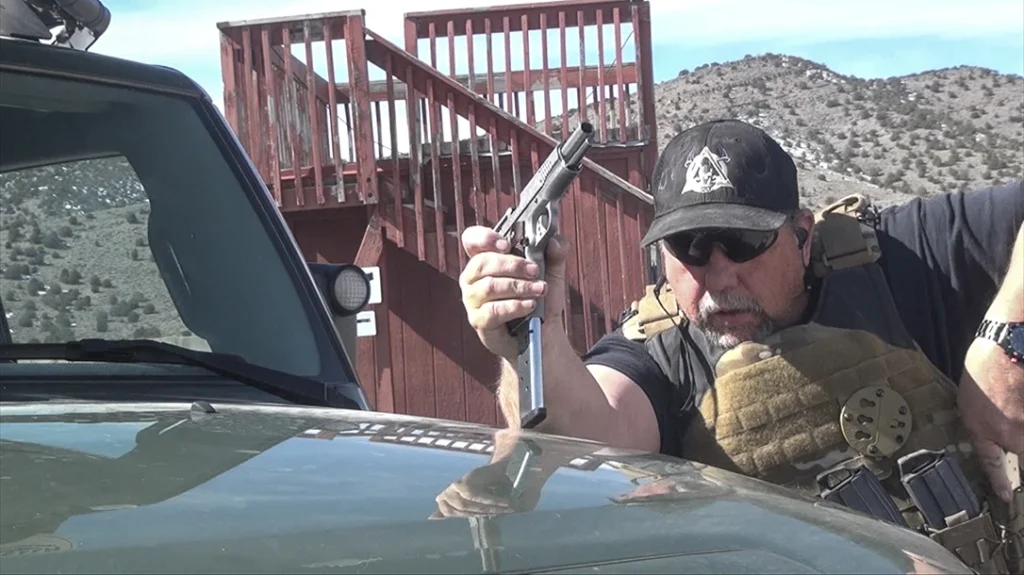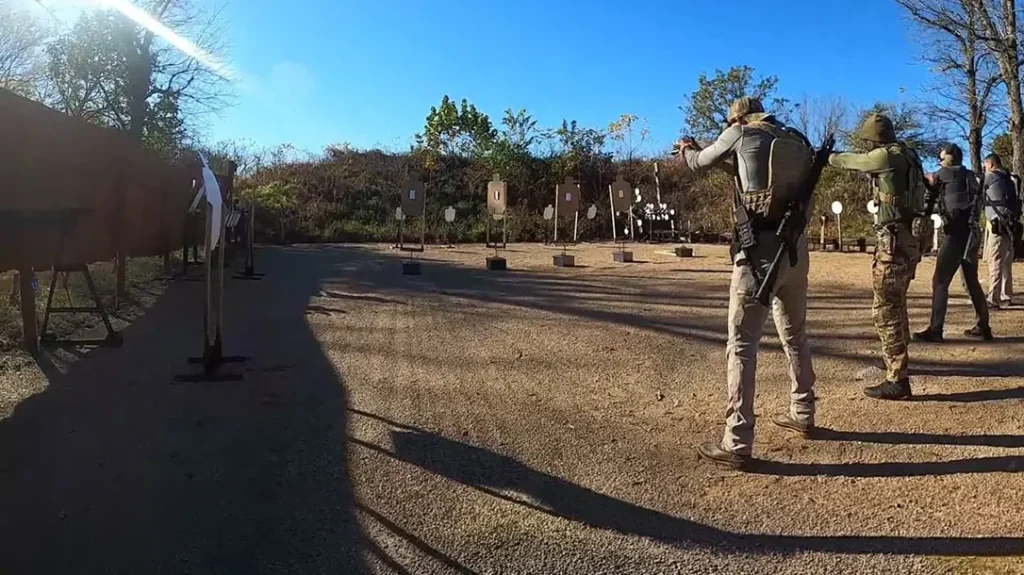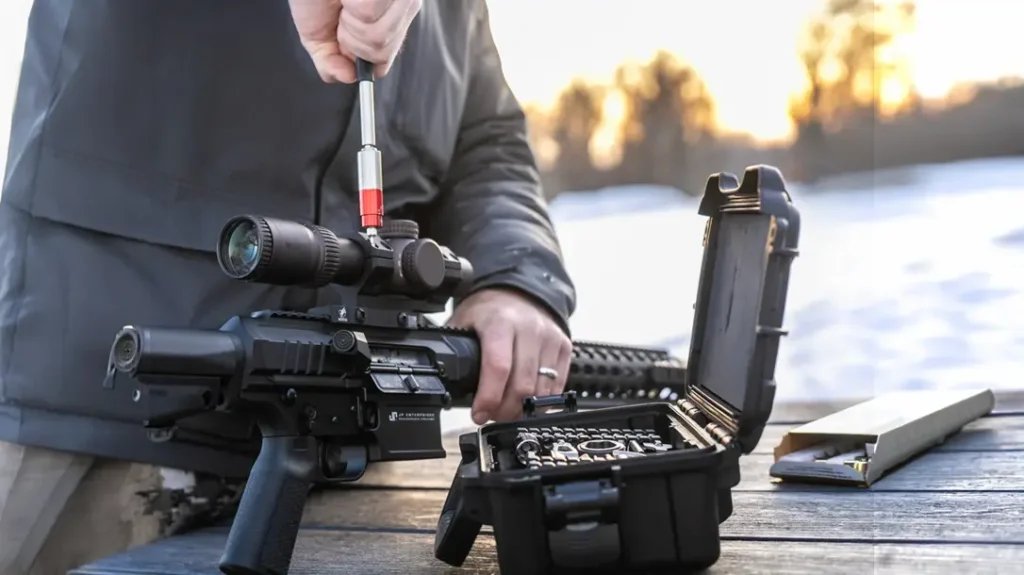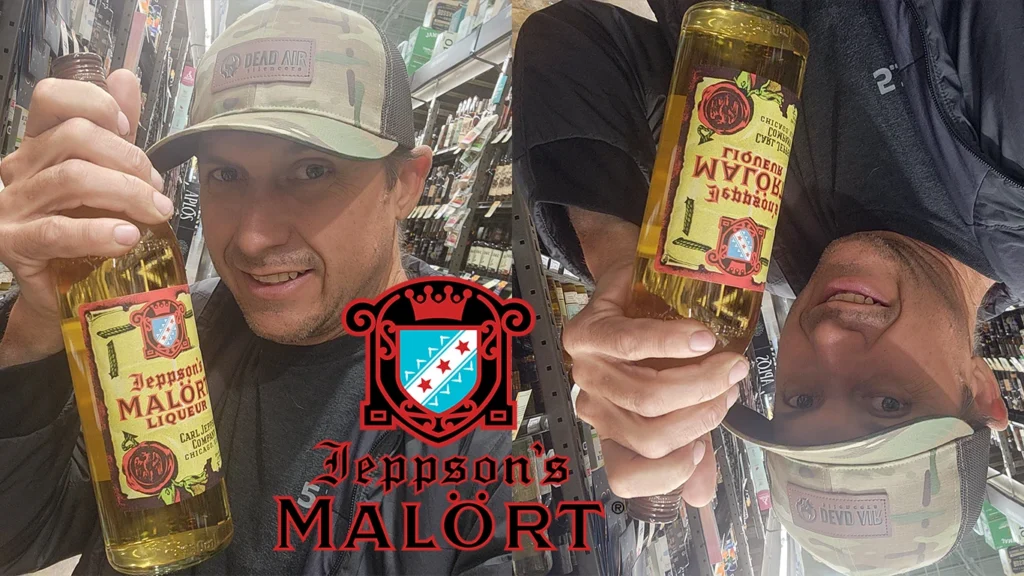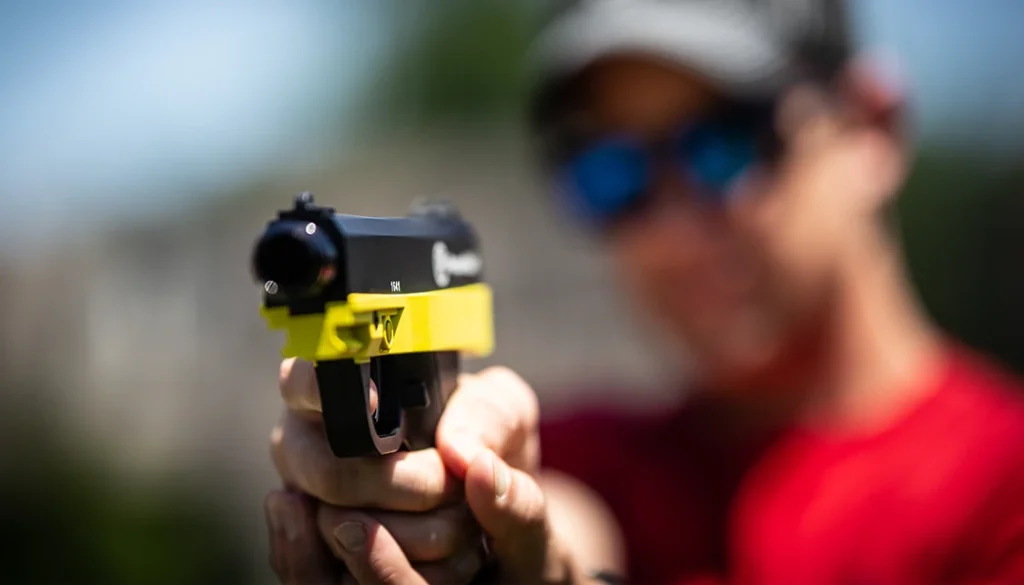Dedicated, focused, powerful and fierce in competition. Jessie Duff is the embodiment of all of these qualities. It makes sense, though. She started shooting competitively at the age of 15, learning from her father, who was a Cowboy Action Shooting (CAS) champion. In her own words, she “grew up on the range” and had access to all of the great shooters at that time. Jessie got her own start in CAS, and she won early on. But it was at the age of 18, after seeing her first Steel Challenge competition, that she realized the type of shooting she wanted to pursue and master. And she did just that.
Jessie Duff now works as a professional shooter for Taurus, where she dedicates countless hours to her craft. She competes mainly in United States Practical Shooting Association (USPSA) matches and Steel Challenge, where she shoots in the .22, Limited, Single Stack and Open divisions. Additionally, Jessie has competed in five out of the seven USPSA divisions—Open, Limited, Limited 10, Single Stack and Production. She’s lightning quick, and if you’ve seen her in action, you too can attest to her explosiveness when moving from point to point during a course of fire.
This explosiveness gives way to precisely executed, machine-like movements, all with effortless grace, as she acquires and engages each target. That’s what Jessie does. And she does it well, with enough titles under her belt to dominate this whole text. But, to name a few: She’s a seven-time USPSA Ladies Limited National Champion, a two-time USPSA Ladies Open National Champion and a three-time USPSA Ladies Single Stack National Champion. The list goes on and on.
Advertisement — Continue Reading Below
Meet The Master
But who is Jessie Duff? That’s what I hoped to find out over the cold and rainy day and a half I was fortunate enough to spend with her in Mississippi. I had lots of questions for Jessie, and we had never met before. To me, she was just a name I’d occasionally heard and a face on a Taurus magazine I had received in the mail. As I prepared to meet with and photograph her, I couldn’t help but think of her as a Danica Patrick of sorts, or another professional athlete. But a phone call changed that point of view, and time with Jessie changed how I think.
Let’s address the obvious: Jessie’s a female competing in a male-dominated sport. The next obvious point is that she competes against other female shooters. So who is her competition? Men? Women? How about everyone. Jessie wants to be the best, period. She was the first female USPSA Grand Master and has set multiple Ladies Steel Challenge world speed-shooting records. Whether it’s against men or women, her only goal is to win. Don’t be misled, though. Her biggest competition has always been Jessie Duff. She explained to me that she focuses on herself and improving her performance each time instead of focusing on any of her fellow competitive shooters. This approach keeps her grounded and sharp. I thought maybe that was lip service, but the look in her eye and the confidence in her voice said otherwise.
Advertisement — Continue Reading Below
I asked Jessie if she thought women were naturally better shooters than men, and if shooters could learn to become great shooters or if they possessed a certain gift for it, the way LeBron James has a gift for what he does on the basketball court. She agreed that women are better shooters and went on to tell me that she definitely believes there are those with an affinity for shooting.
Of course, this doesn’t dismiss all of the necessary hard work and practice that is associated with top-tier shooting. Shooting at this level is an action of thought, prowess and exactness that is consistently executed over and over. The hardest part is probably being consistent. We can all luck out and shoot well occasionally here and there, but practicing and competing weekly at this level is the kind of stuff only a few can do. Jessie opened up a bit and allowed us to peer into her world. Here’s what she had to say.
At what age did you start shooting?
Advertisement — Continue Reading Below
I grew up in a shooting family, so from the time I was just a few months old I was on the range and around the shooting sports. My parents taught my brother and I firearms safety and how to respect and enjoy guns. I started competing at the age of 15 in Cowboy Action Shooting and transitioned to modern disciplines from there.
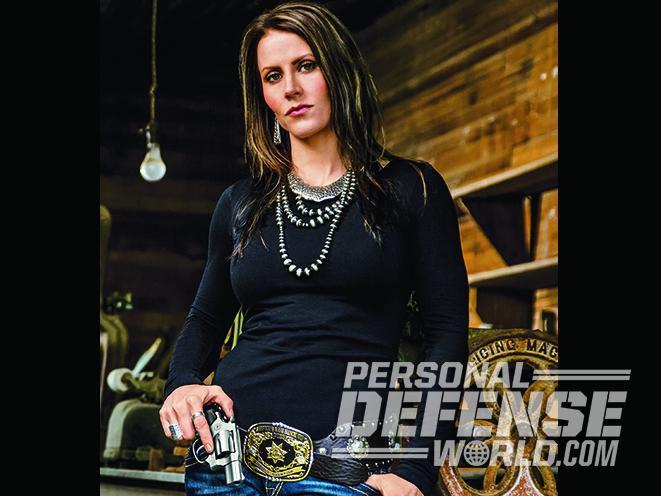
Who were your greatest influences/mentors?
I was very fortunate to be surrounded by great shooters when I started to compete. In Cowboy Action Shooting and practical shooting, we had a talented group of local shooters where I lived in Georgia that I was able to learn from and watch. I would try to emulate what I saw them doing because they were the best. But my father, a world champion shooter, taught me the most important thing of all—that being a champion isn’t just winning. It’s in your heart, your dedication, your passion and who you are on and off the range. Anyone can be gracious when they win, but only a true champion can be gracious when they don’t.
Advertisement — Continue Reading Below
When did you decide to become a professional shooter?
After my first competition, I realized that I wanted to find a way to shoot for a living. I just didn’t know how I would make that happen. I was immediately drawn to the competition aspect and finding ways to do something better or faster. My mom and dad would encourage me through everything, helping me train and pushing me to be and do better. Once I started to see improvements and results, I began to realize that I had a talent for it.
- RELATED STORY: Shooting Tips from USMC Marksman Brian Zins
Do you feel that women need to approach guns and shooting differently than men?
Advertisement — Continue Reading Below
I think it’s different for each individual on how they approach guns. I take a more aggressive approach than most women because my days were spent on the range with my dad and other guys. But I do know that most women today learn better in a less intimidating environment and surrounded by other ladies. I think whatever you are most comfortable with is how you should approach it. Whatever it takes to enjoy it!
What’s the biggest difference between female and male shooters? Do we even need to acknowledge “female shooters” or should everyone simply be a shooter?
I believe women should definitely be recognized among our sport and individually. In all other professional sports, women have their own tournaments and championships. Our sport hasn’t reached that level yet, but it’s growing every day, and it would be amazing to someday have that many female competitors to need our own competitions. But one thing I do like about our sport is that we do get to compete directly alongside the men, so you see women rising above and breaking the stereotype that this is a “man’s sport.”
Advertisement — Continue Reading Below
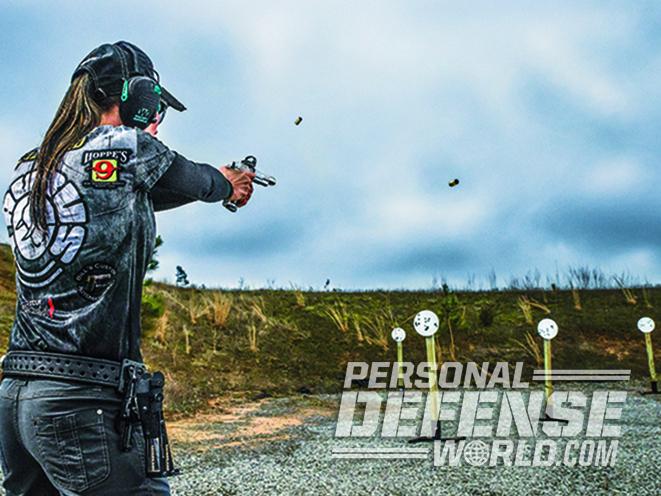
What do you like to do outside of shooting?
Outside of shooting, I love horses. That’s my biggest passion other than shooting. I also love to hunt, fish, snowboard, travel and cook. I love to be outdoors.
How long do you see yourself competing professionally?
I want to shoot as long as I’m physically able, but I’m realistic in how long I’ll be able to compete at the level I’m at. I do, however, want to always be involved in the shooting industry in some capacity, continuing to grow the sport and work with the companies I’m partnered with to promote the industry.
Have you had physical complications from this line of work?
Nothing severe that keeps me from getting out on the range, but towards the end of the season I experience tendonitis and a few aches and pains. I attribute it to many rounds downrange and not my age advancing.
You seem to have it all. What keeps you up at night?
I’ve been very blessed in my career, but it’s from a lot of hard work and dedication. Nothing has been handed to me. I think what keeps me up at night is making sure I’ve done everything possible to prepare for the task at hand, thinking to the future and hoping it continues with as much success as it’s started with, that I represent myself and my sponsors to the best of my ability. I also want to leave this sport better than I came into it, so finding ways to make it more accessible to new shooters and to ensure that it will be here for generations to come.
If you could start over, what is one thing you’d do differently?
I don’t think there is anything I would do differently, simply because everything I’ve done has gotten me to where I am today. It has all happened for a reason, and I’m grateful for the opportunity I’ve been given.
As an industry, are firearms companies doing a good job connecting with women?
The industry has taken some big steps lately to try and reach out to women, since you’re seeing more and more women become involved with firearms. I think there’s definitely more work to be done, but you’re seeing companies with full marketing campaigns geared specifically towards women, which is wonderful.
You’re now on Instagram. Is it fun or just more work?
All social media is work nowadays. It’s the best marketing you can do. But I try to find ways to make it fun and show what I’m doing by giving people a look at range life and promoting the companies that invest in me at the same time.
Does popularity matter in the competitive shooting world? Or just titles?
Performance is always a key component, but it’s not what counts at the end of the day. It’s important to me to be someone who is approachable and likeable at the same time, to be a good role model and just a good person.
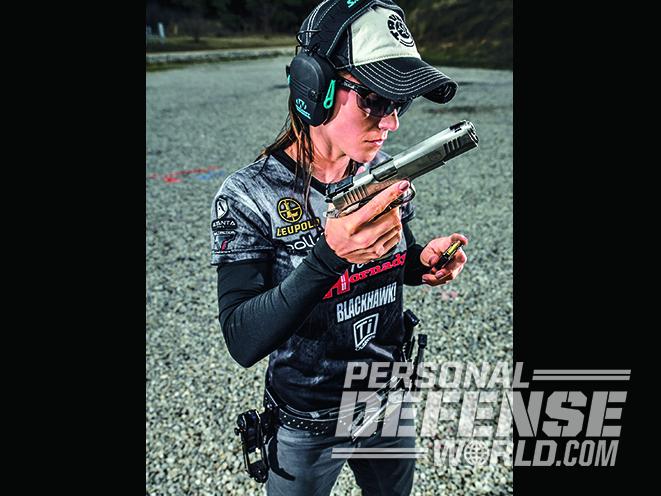
What are the top three items on your bucket list?
Ride in a rodeo, travel the world and experience things I haven’t.
Do you find pink guns marketed specifically toward women offensive?
Pink guns aren’t offensive to me, but I don’t own any. There are many women who like the color pink, but I don’t think that is the only way to attract women to firearms.
What gun do you carry?
I carry a Taurus 738 TCP.
Do you have a favorite caliber?
9mm.
What’s your favorite place/range to compete?
The South River Gun Club in Covington, Georgia. It’s where I grew up shooting.
- RELATED STORY: Gun Review – Taurus PT-111 Millennium G2
Ford, Chevy, Dodge or none of the above?
Ford F-150.
Boots, sneakers or heels?
Boots.
What are some of your guilty pleasures?
Manicures and pedicures on a regular basis and Thin Mint Girl Scout cookies.
If you couldn’t do this for a living, what else would you do?
I would want to do something with horses.
What’s your favorite type of movie?
Comedies. I love a good laugh. But also sappy romantic movies, too.
What’s your preferred game to hunt?
I’ve mostly hunted whitetail, but l love bird hunting—turkey, pheasant, dove, quail.
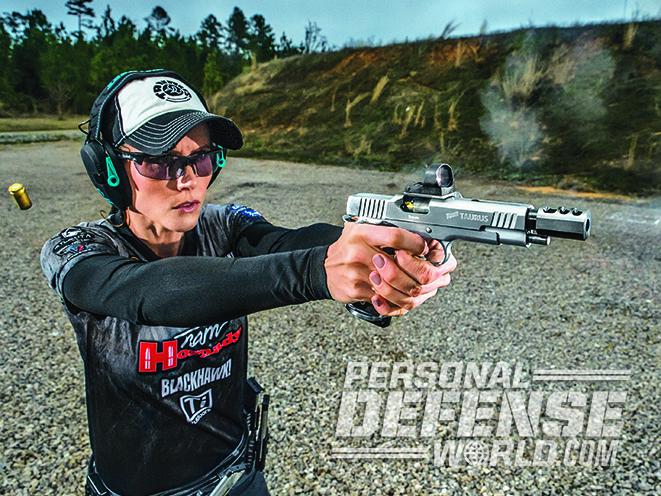
How are your competition guns set up?
My competition guns are all set up for the specific divisions I compete in. The majority of them are built off of the Taurus PT1911 9mm, with different modifications for different types of matches. For Open divisions, I’ve added Schuemann match-grade barrels with compensators, custom slides and Leupold optics. For Limited divisions, I’ve tried to keep the guns as close to factory as possible, only changing out the barrels and a few internal parts and sights. I like to set up all of my firearms with the same trigger weight, around 2 pounds, so that everything feels the same from one gun to the next.
Is there anything about you we don’t know?
I am a “what you see, is what you get” type of person, however I do keep some aspects of life private, to share with my loved ones. But at the end of the day, I’m just someone who found their passion, was able to turn it into an opportunity, and consider myself very blessed!
This article was originally published in ‘Combat Handguns’ February 2017. For information on how to subscribe, please email subscriptions@

